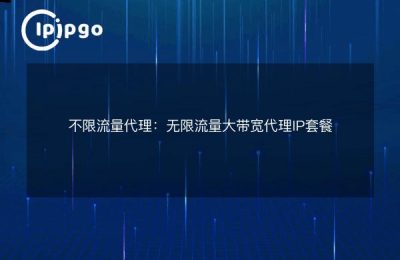
What does a random IP really do? Read these 3 scenarios to understand
The old Zhang recently did e-commerce data collection, found that the target site always blocked his IP. changed a few fixed IP is not useful, this time the random IP will come in handy. It's like guerrilla warfare.Every time you ask, you get a new vest.The website simply can't figure out the real access patterns.
Friends who do testing should have a deep understanding of the need to simulate the effect of user access in different regions. For example, to measure the loading speed of a page, with Beijing IP and Xinjiang IP may be twice the difference. At this timeIPipgo's Global Node RepositoryYou'll be able to pinpoint the network environment wherever you want to measure.
| take | Traditional methods | Randomized IP Program |
|---|---|---|
| data acquisition | Frequently blocked | stable operation |
| Advertising Effectiveness Testing | data distortion | real simulation |
| localized verification | Requires travel | teleswitching |
Hands on with choosing an agent service
The agent service providers on the market are numerous, but there are also many pits. Last week there is a cross-border e-commerce brother, cheap to buy a small workshop agent, the results of the IP purity less than 30%, the data is completely wasted.
There are three hard indicators to look for when choosing an agent:IP pool size, response time, protocol support.. Take IPipgo, their dynamic IP pool hasTen million reservesIt supports socks5/http protocols. Measured latency can be controlled within 200ms, twice as fast as many peers.
Python example (with requests library)
import requests
proxies = {
'http': 'http://user:pass@ipipgo-rotating-node:8080',
'https': 'http://user:pass@ipipgo-rotating-node:8080'
}
response = requests.get('destination URL', proxies=proxies)
print(response.text) Output the result of the visit with random IPs
Practical case: e-commerce data collection
An apparel brand wanted to capture competitor prices and was blocked with less than 50 visits with a fixed IP. After switching to IPipgo's random IP program, theSuccess rate soared from 23% to 98%. The secret lies in their intelligent switching algorithm that automatically adjusts the frequency of IP replacement based on the target site's anti-crawl strategy.
There are two things to keep in mind when configuring: 1) Setting a reasonable request interval 2) Pairing it with a randomized library of User-Agents. It is recommended to use theirBrowser plug-in toolsVisualization is much less time consuming than writing code.
A must-see QA session for the little guy
Q: Is it expensive?
A: IPipgo charges by usage, at least 10 dollars. It's more cost-effective than building your own proxy server, and you don't have to maintain it.
Q: How is IP quality guaranteed?
A: They have a specialty service at their house that can beReal-time detection of IP purity. Problematic nodes are automatically kicked out to ensure availability above 99%.
Q: Do I need to change my account often?
A: No need! One account can call global IP. the background automatically manages the session status, users just use it.
Why IPipgo is the cost-effective choice
After comparing more than a dozen service providers, IPipgo was found to be a good choice inPrice transparencyThe best thing to do on it. Unlike some platforms that hide surcharges, their package page is clearly written. There's also a feature thatFlow can be carried forwardIf you can't use up all your traffic, you can use it next month.
The technology supports on-demand customization, such as specifying the IP of a mobile operator in a certain country, which is especially useful for teams working in overseas markets. Last week, I helped a friend's company to connect to their API, and the whole process was done in less than half an hour.
Lastly, remind newbies not to trust those proxy services that claim to be permanently free. Either the IP quality is poor, or secretly sell your data. Regular service providers like IPipgo havefree trial, it's best to try it out in person before deciding.








